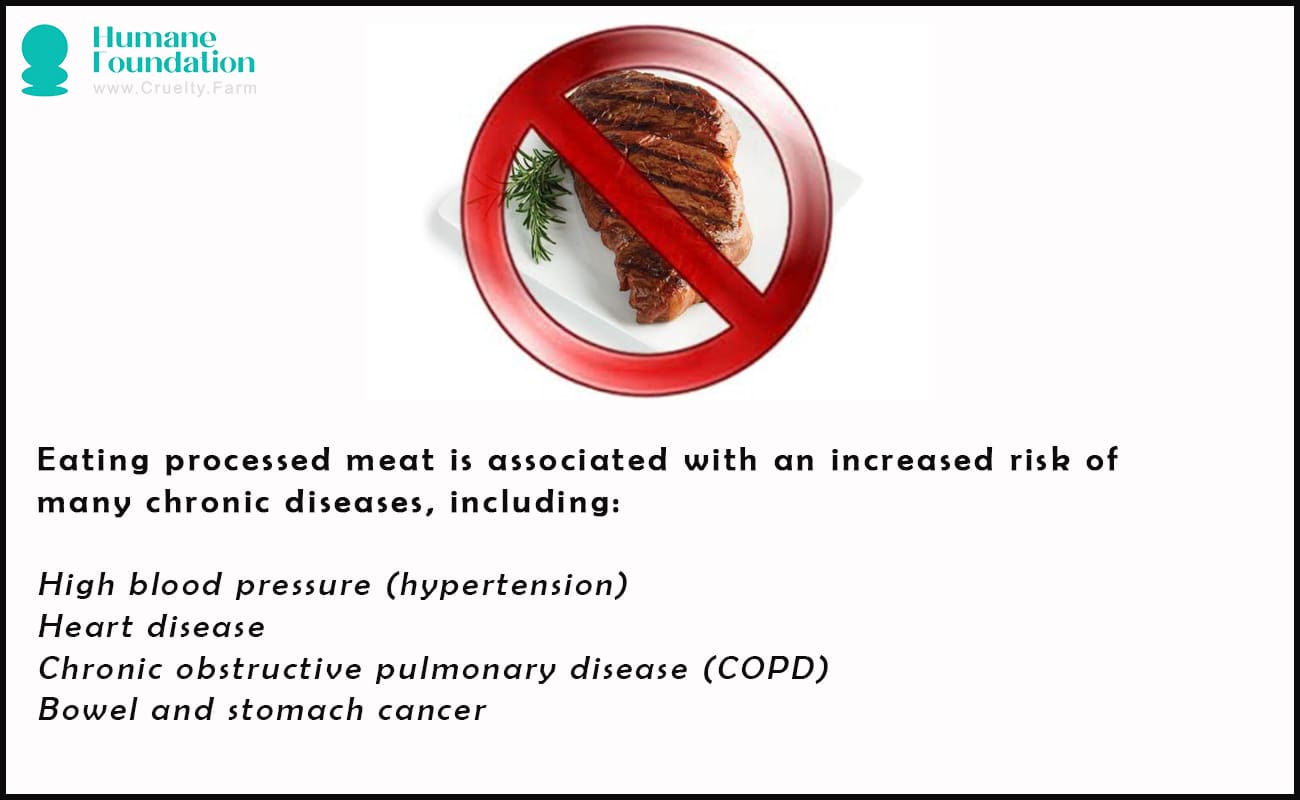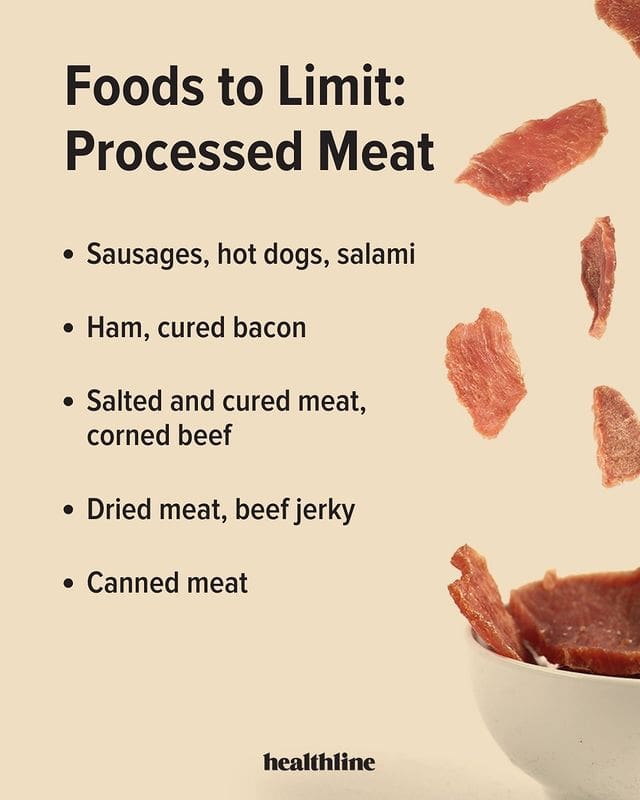High blood pressure is a serious health concern that impacts millions globally, increasing the risk of heart disease and stroke. One effective way to manage hypertension is by reducing high-sodium processed meats in your diet. Foods like deli meats, bacon, and sausages are packed with sodium and additives that can elevate blood pressure by causing fluid retention and straining the cardiovascular system. Making simple swaps—such as choosing fresh, lean proteins or preparing homemade meals with natural seasonings—can significantly lower sodium intake while supporting better heart health. Discover how these small changes can lead to big improvements in overall well-being
High blood pressure, also known as hypertension, affects approximately one in three adults in the United States. It is a major risk factor for heart disease, stroke, and other serious health conditions. While there are various factors that can contribute to high blood pressure, one of the most significant is the consumption of high-sodium processed meats. These types of meats, such as deli meats, bacon, and hot dogs, are not only high in sodium, but also often contain unhealthy additives and preservatives. As a result, they can have a detrimental effect on our blood pressure and overall health. In recent years, there has been a growing concern about the negative impact of processed meats on our well-being, leading many experts to suggest cutting back on these products in order to lower blood pressure. In this article, we will explore the link between high-sodium processed meats and hypertension, and provide tips for reducing our intake of these foods to improve our overall health.
Sodium intake linked to hypertension
Numerous scientific studies have established a clear connection between sodium intake and the development of hypertension. Excessive consumption of sodium, primarily derived from high-sodium processed meats, has been identified as a significant risk factor for elevated blood pressure. The mechanism behind this association lies in the body’s response to increased sodium levels. Consuming high amounts of sodium leads to fluid retention, forcing the heart to pump harder and increasing overall blood volume. This, in turn, puts added strain on the blood vessels, leading to the development and progression of hypertension. Therefore, a reduction in sodium intake, particularly from processed meats, is crucial in the effort to lower blood pressure and promote cardiovascular health.
Processed meats a major culprit
Processed meats have emerged as a major culprit in the context of blood pressure management. These products often undergo extensive processing methods such as curing, smoking, and adding preservatives, resulting in high sodium content. Studies have consistently demonstrated a strong positive correlation between the consumption of processed meats and elevated blood pressure levels. This can be attributed to the excessive sodium present in these products, which disrupts the delicate balance of electrolytes in the body and contributes to fluid retention. By limiting the intake of high-sodium processed meats, individuals can effectively reduce their sodium intake and take a significant step towards lowering their blood pressure levels.

Sodium content varies among brands
The sodium content of processed meats can vary significantly among different brands. This variation is a consequence of different manufacturing processes, ingredients, and seasoning techniques employed by individual companies. It is important for consumers to carefully read the nutrition labels and compare sodium content when selecting processed meat products. This variability in sodium content highlights the need for individuals seeking to reduce their blood pressure levels to be vigilant in their food choices and opt for brands that offer lower sodium options. By being mindful of sodium content and making informed choices, individuals can better control their sodium intake and contribute to the management of their blood pressure.
Switch to fresh, lean meats
To further contribute to the goal of lowering blood pressure, individuals can consider switching to fresh, lean meats as a healthier alternative to high-sodium processed meats. Fresh, lean meats such as skinless poultry, fish, and cuts of beef or pork with visible fat trimmed off offer numerous nutritional benefits. These meats are generally lower in sodium compared to processed alternatives, and they also provide essential nutrients such as protein, vitamins, and minerals. By incorporating fresh, lean meats into their diet, individuals can reduce their intake of sodium and saturated fats, which are known to contribute to high blood pressure and cardiovascular health risks. Additionally, opting for fresh, lean meats allows individuals to have more control over the seasoning and preparation methods, further promoting a healthier eating pattern and contributing to the overall management of blood pressure.

Read labels and compare sodium
Monitoring sodium intake is crucial for effectively managing blood pressure. One practical strategy is to carefully read food labels and compare sodium content among different products. Sodium levels can vary significantly even within the same food category, so it is essential to compare options to make informed decisions. By paying attention to the sodium content on labels, individuals can identify lower-sodium alternatives and prioritize those choices. This approach empowers individuals to actively manage their sodium intake and make responsible dietary choices that align with their blood pressure management goals. Additionally, this practice encourages individuals to become more aware of the sodium content in their diet overall, facilitating a long-term commitment to maintaining healthy blood pressure levels.
Limit deli meats and sausages
Consuming excessive amounts of deli meats and sausages can contribute to elevated blood pressure levels due to their high sodium content. These processed meats are often cured or preserved using salt, resulting in elevated sodium levels that can negatively impact blood pressure regulation. By limiting the intake of deli meats and sausages, individuals can significantly reduce their sodium consumption, promoting a healthier blood pressure profile. Instead, individuals can opt for healthier protein sources such as lean meats, poultry, fish, or plant-based alternatives that are lower in sodium and offer additional nutritional benefits. Making this dietary adjustment can contribute to effective blood pressure management and overall cardiovascular health.

Opt for homemade alternatives instead
In order to further reduce sodium intake and promote better blood pressure control, individuals can consider opting for homemade alternatives instead of high-sodium processed meats. By preparing meals at home, individuals have greater control over the ingredients and seasoning used in their dishes. This allows for the incorporation of flavorful herbs, spices, and natural seasonings that can enhance the taste of meals without relying on excessive sodium. Homemade alternatives also provide the opportunity to select lean cuts of meat, fresh poultry, or plant-based protein sources that are naturally lower in sodium. Additionally, the use of homemade marinades and dressings can further enhance the flavor of dishes without relying on high-sodium additives commonly found in processed meats. By choosing homemade alternatives and incorporating healthier ingredients, individuals can take significant strides towards effectively managing their blood pressure and improving their overall cardiovascular health.
Reducing sodium can lower BP
Scientific evidence consistently supports the notion that reducing sodium intake can successfully lower blood pressure levels. Excessive sodium consumption has been linked to increased fluid retention and elevated blood pressure, as it disrupts the delicate balance of electrolytes in the body. By cutting back on high-sodium processed meats, individuals can significantly decrease their sodium intake, thus promoting better blood pressure control. High-sodium processed meats are notorious for their contribution to the average diet’s sodium load, often containing excessive amounts of added salt and preservatives. By opting for homemade alternatives, individuals can prioritize the use of fresh, unprocessed meats that are naturally lower in sodium. This dietary modification, combined with the incorporation of other heart-healthy practices, such as regular exercise and a balanced diet, can lead to substantial improvements in blood pressure management and overall cardiovascular health.
In conclusion, the findings of this study provide further evidence that reducing the consumption of high-sodium processed meats can have a significant impact on lowering blood pressure. With hypertension being a major risk factor for heart disease and stroke, this simple dietary change has the potential to greatly improve public health outcomes. It is important for individuals to be aware of the sodium content in their food choices and to make informed decisions in order to maintain a healthy blood pressure and overall well-being. Further research is needed to explore the long-term effects of reducing high-sodium processed meats in the diet, but this study highlights the potential benefits of this dietary modification.
FAQ
How does consuming high-sodium processed meats contribute to high blood pressure?
Consuming high-sodium processed meats contributes to high blood pressure because excessive sodium intake disrupts the balance of fluids in the body, causing an increase in blood volume and leading to elevated blood pressure. The high sodium content in processed meats contributes to sodium overload, as most people already consume more than the recommended daily limit. This puts strain on the blood vessels and heart, increasing the risk of hypertension. Additionally, processed meats are often high in unhealthy fats and additives, which can further contribute to high blood pressure and other cardiovascular problems.
What are some alternative protein sources that can be substituted for high-sodium processed meats?
Some alternative protein sources that can be substituted for high-sodium processed meats include legumes, such as lentils and chickpeas, tofu, tempeh, seitan, and plant-based protein sources like quinoa and edamame. These options provide a healthier alternative as they are lower in sodium and offer additional nutritional benefits such as fiber, vitamins, and minerals. Incorporating these alternatives into meals can help reduce sodium intake while still satisfying protein needs.
Are there any specific types of processed meats that are particularly high in sodium?
Yes, there are specific types of processed meats that are particularly high in sodium. Some examples include deli meats, bacon, hot dogs, sausages, and canned meats. These products often undergo processes such as curing, smoking, or preserving, which can significantly increase their sodium content. It is important to check nutrition labels and choose lower sodium options or limit the consumption of processed meats to maintain a healthy diet.
How much sodium should be consumed per day to maintain a healthy blood pressure?
The American Heart Association recommends consuming no more than 2,300 milligrams (mg) of sodium per day in order to maintain a healthy blood pressure. However, for individuals with high blood pressure or other health conditions, the recommended limit is even lower, at 1,500 mg per day. It is important to read food labels, limit processed foods, and choose low-sodium alternatives to reduce sodium intake and maintain a healthy blood pressure.
Are there any other dietary changes that can help lower blood pressure besides cutting back on high-sodium processed meats?
Yes, there are several dietary changes that can help lower blood pressure besides cutting back on high-sodium processed meats. Some of these include reducing the intake of added sugars and sugary drinks, limiting alcohol consumption, increasing the consumption of fruits and vegetables, opting for whole grains instead of refined grains, incorporating lean protein sources such as fish and poultry, and consuming low-fat dairy products. Additionally, following the DASH (Dietary Approaches to Stop Hypertension) diet, which emphasizes fruits, vegetables, whole grains, lean proteins, and low-fat dairy, has been shown to effectively lower blood pressure. Regular physical activity and maintaining a healthy weight also play a crucial role in managing blood pressure.



